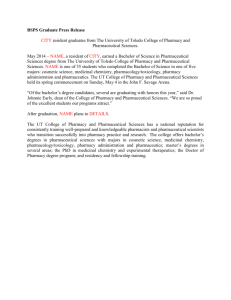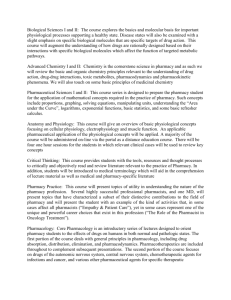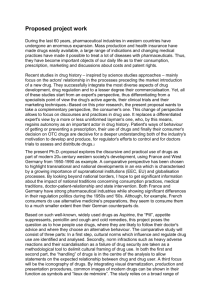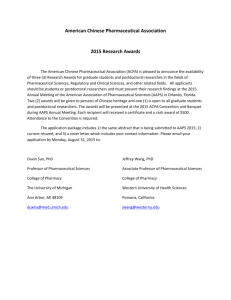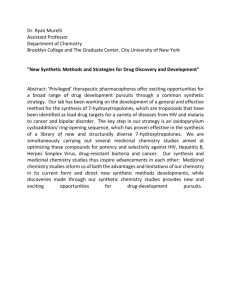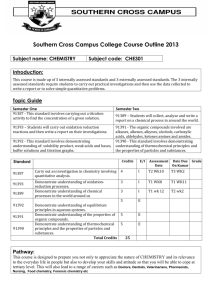Course Description
advertisement
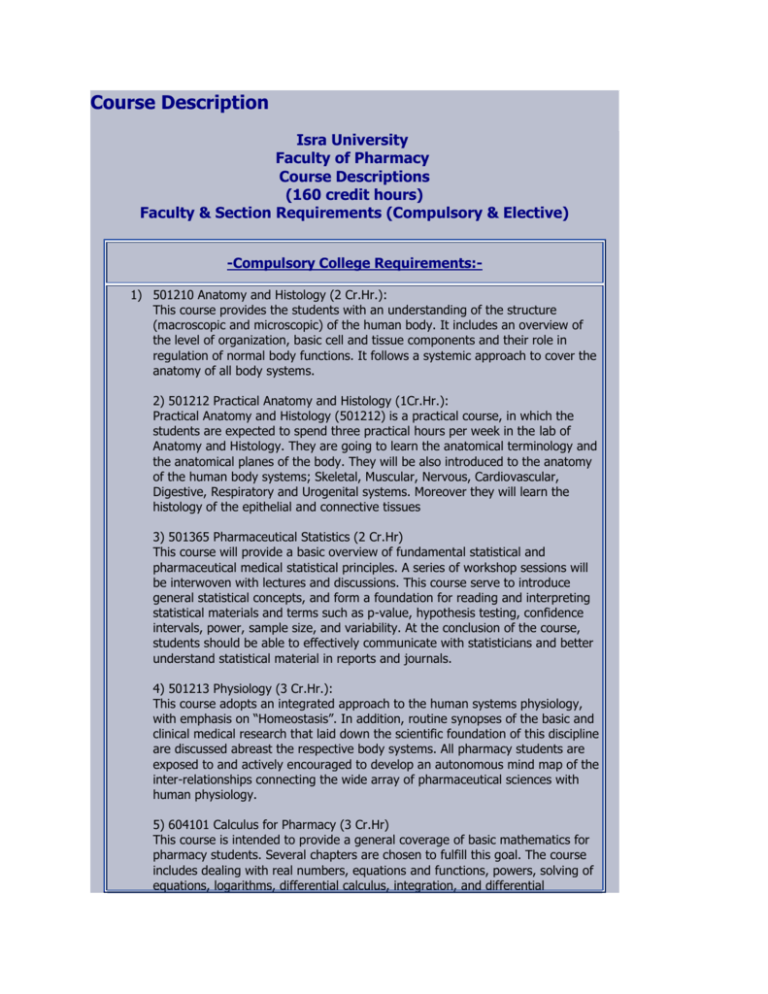
Course Description Isra University Faculty of Pharmacy Course Descriptions (160 credit hours) Faculty & Section Requirements (Compulsory & Elective) -Compulsory College Requirements:1) 501210 Anatomy and Histology (2 Cr.Hr.): This course provides the students with an understanding of the structure (macroscopic and microscopic) of the human body. It includes an overview of the level of organization, basic cell and tissue components and their role in regulation of normal body functions. It follows a systemic approach to cover the anatomy of all body systems. 2) 501212 Practical Anatomy and Histology (1Cr.Hr.): Practical Anatomy and Histology (501212) is a practical course, in which the students are expected to spend three practical hours per week in the lab of Anatomy and Histology. They are going to learn the anatomical terminology and the anatomical planes of the body. They will be also introduced to the anatomy of the human body systems; Skeletal, Muscular, Nervous, Cardiovascular, Digestive, Respiratory and Urogenital systems. Moreover they will learn the histology of the epithelial and connective tissues 3) 501365 Pharmaceutical Statistics (2 Cr.Hr) This course will provide a basic overview of fundamental statistical and pharmaceutical medical statistical principles. A series of workshop sessions will be interwoven with lectures and discussions. This course serve to introduce general statistical concepts, and form a foundation for reading and interpreting statistical materials and terms such as p-value, hypothesis testing, confidence intervals, power, sample size, and variability. At the conclusion of the course, students should be able to effectively communicate with statisticians and better understand statistical material in reports and journals. 4) 501213 Physiology (3 Cr.Hr.): This course adopts an integrated approach to the human systems physiology, with emphasis on “Homeostasis”. In addition, routine synopses of the basic and clinical medical research that laid down the scientific foundation of this discipline are discussed abreast the respective body systems. All pharmacy students are exposed to and actively encouraged to develop an autonomous mind map of the inter-relationships connecting the wide array of pharmaceutical sciences with human physiology. 5) 604101 Calculus for Pharmacy (3 Cr.Hr) This course is intended to provide a general coverage of basic mathematics for pharmacy students. Several chapters are chosen to fulfill this goal. The course includes dealing with real numbers, equations and functions, powers, solving of equations, logarithms, differential calculus, integration, and differential equations and some of their applications in kinetics and thermodynamics. 6) 607103 General Chemistry (3 Cr. Hr.): This course provides the students with the scientific measurements, arithmetical relationships for chemical compounds and chemical reactions, atomic structure, molecular structure, periodic chart, chemical bonding, gases and their laws, states of matter and forces among molecules, properties of water solution. The course aims to make students able to carry chemical calculations, to enhance their abilities of subjects related to analytical and physical chemistry, such as properties of gases, kinetics, chemical equilibrium, acid-base equilibrium and the titration processes based on equilibrium. Also chemical thermodynamic and electrochemistry. 7) 607104 Practical General Chemistry (1 Cr. Hr.) The course is designed to provide the students with basic laboratory techniques, and identification of physical and chemical properties of matter, and how to determine the empirical formula of compounds and hydrated salts, also to demonstrate titrimetric analysis methods and chemical equilibrium. 8) 607107 Organic Chemistry (3 Cr. Hr.): The course deals with the study of fundamentals of organic chemistry: structural theories, chemical bonds representation of structural formulas, molecular orbital theory, bond breaking, classification of reagents, electronic mechanism, synthesis, reactivity and mechanism of reactions of different classes of aliphatic and alicyclic and aromatic organic compounds: alkanes, cycloalkanes, alkenes, alkynes, alcohols, ethers, phenols, thiols and epoxides. This course also involves sterochemistry including both conformational and configurational isomerisms: optical and geometrical isomers. 9) 609101 General Biology (3 Cr.Hr) This course provides the students with the basic information regarding carbon and molecular diversity, nucleic acids, metabolism, cell structure, cellular respiration, Mendel and the gene idea, and chromosomal basis of inheritance. It also includes plant, animal structure and physiology, prokaryotes, protests, fungi and the immune system. 10) 609103 Practical General Biology (1 Cr.Hr) Practical General Biology (609103) is a practical course, in which the students are expected to spend three practical hours per week in the lab of Practical General Biology. The students will be introduced to most of the fields of biological sciences. After they learn how to use and handle the light microscope, they learn how to prepare a simple wet mount. Then they learn the names and functions of the cells' constituents. Afterwards, they perform experiments to get some knowledge about the chemical and physical properties of the cells. Moreover, they get some information about the cell divisions, the enzymes and the metabolic processes and Plant organs and tissues are also covered in this course. 11) 501235 Pharmaceutical Analytical Chemistry (3 Cr.Hr.): The aim of this course is to study the basic concepts of analytical chemistry as units, concentration types, stoichiometric calculations and solutions. Errors in chemical analysis, gravimetric methods, titrimetric methods, neutralization titration and their applications, precipitation, complex–formation titration and introduction to electrochemistry. The official pharmacopoeias, pharmaceutical analysis and quality control. 12) 501247 Pathophysiology (3Cr.Hr.) The aim of this course is the understanding of disease mechanisms based on physiological principles. It includes how cells, tissues organs and organ systems respond to disease. The course includes general principles of pathology such as general concepts of disease, cellular injury and cell death, response of the body to injury (inflammation and repair) disturbances in circulation, disturbances in growth, cellular proliferation and differentiation and hematologic system disorders. It includes cardiovascular system disorders, gastrointestinal system disorders, renal system and metabolic disorders, respiratory system disorders, neurological system disorders, and reproductive system disorders. 13) 501256 Pharmaceutical Organic Chemistry (3Cr.Hr.) The course deals with the study of chemistry of the following compounds; alkyl benzenes, aldehydes and ketones, carboxylic acids and derivatives, amines and arenediazonium salts, in addition to synthesis, reactivity and mechanism of reactions of different classes of medicinally important heterocycles: three to seven membered heterocycles, benzoheterocycles and fused-heterocycles, and applications of drugs. 14) 501257 Practical Pharmaceutical Organic Chemistry (1 Cr.Hr.) This course provides the students with some organic preparative reactions and synthesis of some important organic compounds such as alcohol, esters, acids and phenols. The course also involves multiple step syntheses. 15) 501269 Instumental Analysis (3 Cr.Hr.): This course aim to introduce the student with the basic and wide used instruments by studying the theoretical part, instrumentation and applications of these instruments: UV/VIS, IR, Flamephotometry, Atomic Absorption and Polarimetry. Besides, students study principles of electrochemistry, potentiometric methods, polarography and methods and applications of chromatography especially GC and HPLC. Basic of NMP and mass spectroscopy. 16) 501270 Analytical Chemistry and instrumental analysis Lab (1 Cr.Hr.): The aim of this course is to learn basic practical skills in analytical chemistry, that includes gravimetric determination of Ni and of chloride, acid–base titration, back titration, titration of a mixture of carbonate–bicarbonate, redox titration, compleximetric titration and water hardness, precipitation and Argentometric titrations. It also provides the students with learning about basic instruments and instrumental techniques. This includes single beam spectrophotometer, Double beam spectrophotometer, Analysis of a mixture, qualitative application spectroscopy, flame photometry. 17) 501309 Pharmaceutical Biochemistry (3 Cr.Hr.): The purpose of this course is to make biochemistry as clear and interesting as possible and to familiarize the students of pharmacy and medical technology with the major aspects of biochemistry. This course covers the vital mechanisms explained by biochemistry, the molecular nature of cellular components, and the dynamic aspects of biochemical reactions. 18) 501313 General Microbiology (3 Cr.Hr.): This course provides pharmacy students with the background they need in different aspects of microbiology for their further courses in Pharmaceutical Microbiology & Immunology. It also provides them with necessary knowledge in microbiology for other courses such as Pathophysiology, Pharmacology and Clinical Pharmacy. The course covers the basic principles of microbiology, and then provides detailed information on major microbes (bacteria, viruses, fungi &protozoa) regarding their properties, transmission, pathogenesis, clinical findings, laboratory diagnosis, treatment and preventions. 19) 501335 Chemistry of Natural Products (3 Cr.Hr.): This course comprises an introduction to natural products chemistry (pharmacognosy) covering definition of pharmacognosy, crude drugs and medicinal plants. It also covers the nomenclature of medicinal plants, production, drying as well as drug discovery technologies, and development of drugs from plant to pharmaceuticals. Emphasis will be given to the study of the most common bioactive constituent’s classes such as polyketides, phenolics, terpenes, and alkaloids. The Methods of their preparation and isolation from their sources, structure activity relationship (SAR) and medicinal uses of these constituents will also be covered. 20) 501336 Practical Chemistry of Natural Products (1 Cr.Hr.): The purpose of this course is to the practical aspects of Phytochemistry, mainly methods used for screening, isolation, identification and quantitative determination of the main active constituents present in plants as volatile oil, glycosides, alkaloids, bitter principles …etc by applying a new methods as PC, TLC, GLC, HPLC. etc. 21) 501361 Medicinal Chemistry-1 (3 Cr.Hr.): This course is designed to expose the third year-undergraduate students to the history, theory and practice of Medicinal Chemistry. It starts with a general introduction overviewing the relationship between medicinal chemistry and pharmacology and pharmacy practice, and covering definitions, naming of drugs and classification of drugs. The introductory part also illustrates the relation between physicochemical properties of different drugs and their biological activities, an explanation of the receptor site theory and drug-receptor interactions and a study of the metabolic fate of drugs. Then, the formal part of the course covers the structure, function and presentation of the following classes of therapeutic agents: drugs acting on the Autonomic Nervous System, local anesthetics and antihistaminic agents; Cardiovascular drugs and Diuretics. 22) 501462 Medicinal Chemistry-2 (3 Cr.Hr.): This course describes the medicinal agents from both the chemical and biological aspects and covers Drugs affecting the central nervous system, Hormones and related compounds, Drugs affecting metabolic function, including hypoglycemic and antithyroid agents; Prostaglandin and Non-steroid antiinflammatory drugs. In each class of compounds, the course accentuates the relationship of the chemical structure to the biological activity and the chemical basis of the drug action. 23) 501363 Pharmacology-1 (3 Cr.Hr.): This course is designed to provide the student with full understanding of the basic principle of Pharmacology, including discussions of drug- receptor Interactions concept, mode of action of drug, factors Modifying drug responses and adverse effects, dose-Response relationship, drug toxicity, pharmacokinetic and pharmacodynamic of the drug also discussion of the Drug acting on cardiovascular system, urinary system, drugs Affecting the blood and the autocoids. . 24) 501364 Practical Medicinal Chemistry (1 Cr.Hr.): This practical course allows the pharmacy students to apply their basic knowledge in Instrumental and analytical chemistry in the pharmaceutical analysis. Different inorganic and organic medicinal in their pharmaceutical forms are quantitatively analyzed. In addition prescriptions containing two or more ingredients are analyzed for their active principles, also how to Identify drugs chemically. 25) 501465 Medicinal Chemistry III (3 Cr.Hr) The course describes the medicinal agents from both the chemical and biological aspects classification of drugs is based on the pharmacological action, and the available course covers radiopaquesm vitamins & Biopharmacerticals . Effect of metabolism in drug design is also covered .. the course accentuates the relationship of the chemical structure to the biological activity and the chemical basis of the drug action . 26) 501415 Pharmaceutical Microbiology (3 Cr.Hr) The course provides students with the required knowledge regarding the use of microorganisms in different aspects of pharmacy with a particular emphasis on the pharmaceutical Industry. This also includes the principles of disinfection, Sterilization, preservation, good manufacturing practice, contamination of pharmaceutical products. The second part of the course provides students with the principles of immunology, the basic and clinical aspects. The basic parts includes hum oral and cellular immune response, while the clinical part deals with hypersensitivity (allergy), transplantation & immunological diseases 27) 501417 Immunity and vaccines (2 Cr.Hr) This course is designed to give students the basic concepts of immunology including the anatomy and physiology of the immune system, the nonspecific and specifc mechanisms of defense through the innate immunity and adaptive immunity respectively. Moreover, this course will cover topics in practical applications of immunology such as vaccines, diagnostic immunity, and disorders associated with the immune system. 28) 501416 Practical Pharmaceutical Microbiology (1 Cr.Hr.): This practical course provides the student with the methods of monitoring sterilization, evaluation of disinfectants and preservation, biological assays (MIC and MLC). In addition to some experiments of immunodiagnostic tests (Agglutination and ELIZA) 29) 501424 Phytotherapy (3 Cr.Hr.): This course is designed to familiarize the students with herbal medicine and popular herbal products. Focus will be on the plant part used as drug (i.e bark, leaves, herb, roots, seeds, fruits and flowers), their origin, active constituents, pharmacological uses, dose, frequency and duration of treatment, contraindications, herb-herb and herb-drug interactions, mechanism of action, mode of administration, and side effects. Herbal products and herbal medicines will be covered according to the biological systems they affect. 30) 501431 Pharmacology-2 (3 Cr.Hr.): This course is a continuation of pharmacology 1, it includes Discussions of drugs used in chemotherapy of infections and Cancer, the drugs acting on the central nervous system, gastro-Intestinal system, respiratory system, the endocrine system, the Hormones and their antagonists, and the immunosuppressant Agents. 31) 501451 Clinical Biochemistry (3 Cr.Hr.) The purpose of this course is to review basics of interest and to help students understand the role of laboratory testing in health care; including: Nitrogenous compounds, electrolytes, proteins carbohydrates, enzymes, porphyrins, lipids, endocrinology, drugs, liver, GI, pancreatic, renal, thyroid and nutrition 32) 501452 Practical Clinical Biochemistry (1 Cr.Hr.): The aim of this course is the application of different methods for the determination of body fluids components. The test results of body fluids and biochemical changes, which occur in disease process, are discussed, correlated and interpreted as an aid diagnosis for the treatment of disease. 33) 501473 Biopharmaceutics & Pharmakokinetics (3 Cr.Hr.): The purpose of this course is to study of the physicochemical and biological factors that influence drug absorption and bioavailability for different formulation. Studying the drug distribution in the body, protein binding, renal and heptic clearance, prediction of plasma and urine drug concentration based upon pharmacokinetic parameters after single and multiple prediction of plasma and urine drug concentration based upon pharmacokinetic parameters after single and multiple intravenous and oral dose. 34) 501474 Practical Biopharmaceutics & Pharmakokinetics (1 Cr.Hr.): The purpose of this is the application of pharmacokinetic parameters to selected problems. Studying the effect of different formulation factors, affecting bioavailability of drugs from tablets suppositories and topical formulation. 35) 501533 Toxicology (2 Cr.Hr.): This course deals with (a) The role of drug therapy, drug toxicity and overdosage, drug-interaction and adverse reaction, (b) Toxicokinetic and toxicogentic- interaction, (c) Poisons, drug- induced poisoning, and treatment of poisoning and their antidotes, (d) Systemic and Clinical toxicology, (e) Environmental toxicology, (f) Food poisoning, and (g) Radiation toxicology. 36) 501543 Pharmaceutical Biotechnology (3 Cr.Hr.): This course is designed to provide student with the basic information about enzymes, their production, immobilization technology and it's application and fermentation; covering general consideration to industrial applications. Basic genetics is given to prime up the existing familiarity and knowledge in this rapidly expanding science, recombinant - DNA technology where gene engineering, cloning and expression as well as various applications are also discussed. 2) 37) 501546 Therapeutics & Clinical Pharmacy (1) (3 Cr.Hr.): This course teaches the students how to use the drugs in the treatment of certain diseases taking into consideration the Pathophysiology and clinical presentation of these disease; clinical interpretation of laboratory results; the pharmacokinetic characteristics, side effects and drug interactions of the drugs used. The monitoring parameters of the disease and drug efficacy and toxicity are also discussed. 38) 501547 Therapeutics & Clinical Pharmacy (2) – Practical Course (3 Cr.Hr.): This course teaches the student how to apply the knowledge learned in the theoretical part of the course on actual patient cases. 39) 501571 Pharmaceutical Legislations & Ethics (1 Cr.Hr.): The purpose of this course is to cite a brief summary concerned with the general history of pharmacy, and to provide an outline of Legislations that affects the practice of pharmacy in Jordan, together with an account of pathways in which Jordanian Pharmacies have developed and maintained their standard of professional conduct. 40) 501574 Pharmacy Practice Lab (3 Cr.Hr.): The purpose of this course is developing interpersonal skills in pharmaceutical care and pharmacy practice. Definition of pharmacy practice, pharmacists role as drug advisor and consultant, adverse reactions and drug-drug interactions and their prevention, review of pharmaceutical Latin abbreviations, selfmedication and the role of pharmacist as drug expert in interviewing and advising the patient on the use of OTC medication. 41) 501589 Drug Economics (3 Cr. Hr.): This course is designed to provide the student with the principles of economics and pharmaceutical administration, marketing product, price, channels of distribution and promotion. 42) 501590 Hospital Pharmacy (3 Cr.Hr.): This course is designed to provide the student with the objective of the hospital pharmaceutical service which is safe effective medication for all patients attending hospitals and clinics and it will include: provision of services, production of medicines, patient services and provision information. - Elective Section Requirements:-
